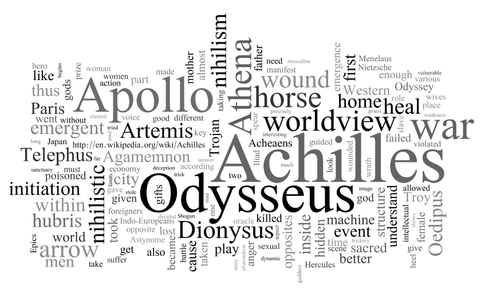Tags
Drawing from an epiphany after reading the Iliad and The Republic, my own understanding of worldview has shifted from a mostly intellectual undertaking, to a new paradigm in which the metaphysical is as mystical and yet down to earth as swift-footed Achilles.
In practice, my epistemology was correct, but in naming it, I opted for the good country sought by Lot instead of faithful Abraham who received his son raised from the dead in a vision. True epistemology is found by a faith seen with the eye of the imagination. Homer was on to something.
While abhorring the post-modern tendency toward reductionism, where the goal is to strip down the machinery to the last bolt, I found myself committing a similar outrage. Like Socrates, my journey up from darkness was met with blinding light in which I assumed the revelation of the logical and reasoned assent was mission accomplished. “Ah, so that’s what they meant,”…I thought as I enthusiastically high-fived others who were emerging from Plato’s cave.The on-going quest to descend and escort more of humanity up from wrong-headed thinking was a mission field (the future of civilization depended on it). Worldview is after all philosophy…isn’t it?
 The Muses Sang
The Muses Sang
I had wrongly assessed the epistemology that rescued me. It wasn’t so much in knowing, but more in seeing with the eyes of the imagination…knowing by way of a narrative.
At least I had known where to begin to find the answers. Oswald Chamber said, “Books are standing counselors and preachers, always at hand, and always disinterested; having this advantage over oral instructors, that they are ready to repeat their lesson as often as we please.”
C.S. Lewis understood too, he wrote,
My own eyes are not enough for me; I will see through those of others…in reading great literature I become a thousand men and yet remain myself….I see with a myriad of eyes, but it is still I who see. Here, as in worship, in love, in moral action, and in knowing, I transcend myself; and am never more myself than when I do.
Thus, I turned to my books, where the living and the dead speak; where the consequences of ideas are known. These were teachers, friends, and comforters. Past and present, they were wise. I desperately needed to know the ideas that brought me to that dreadful hour. Yet, I mistook the ideas that are found out deductively for an all-encompassing reality about my dilemma. I reasoned my way to spiritual health, or so I assumed. Solomon understood the trap we can fall into with much learning:
Besides being wise, the Preacher also taught the people knowledge, weighing and studying and arranging many proverbs with great care. The Preacher sought to find words of delight, and uprightly he wrote words of truth.
The words of the wise are like goads, and like nails firmly fixed are the collected sayings; they are given by one Shepherd. My son, beware of anything beyond these. Of making many books there is no end, and much study is a weariness of the flesh. Eccl. 12:9-12 (ESV)
Knowing a thing intellectually or philosophically is only one kind of knowing, and I am convinced now that it is not the best kind of knowing. While helpful, Plato’s theory of Ideas falls short. Like Achilles, we never make it home to the Pythia. Instead, we are left presiding over and judging the dead. At least this much I had in common with Achilles, as I wrote in The Unforgiving Minute:
Keeping the mind stayed on Christ during the lawless hours of unconscious is a battle. Anarchy creeps to raise kinship under the nocturnal cloak. The wounds of the broken heart cry out in the eventides for solace. Many nights, startled awake in anguish, paralyzed with uncertainties; I called on the Name above all Names — the only thing high enough to surmount the fears of what would come tomorrow. Arrows in the night, sorrows, piercing sorrow.
For the covenant-keeper, it is the unfathomable. The sacred violently torn from life without pity. Scattered pieces of animal flesh to which Abraham walked in the midst now appear as your own bowels scattered in bloody ruin. Each segment a master of sentient longing, of words unsaid, of deeds undone. Of sepulchers whitewashed. The ensuing post covenant nights begin and end the same. Nightfall, the welcome comforter that before naturally enfolded you in billows of sleep, transformed to dread. Like a monster that returns to the same lair, evening came calling to set the stage for a tragedy in which I was forced to act.
Though I began poetically, for that was the only way I could name the pain rightly, I didn’t do it purposefully, nor even realize it. In fact, although my thinking during this period was fully imaginative, I “named” the thing that I was doing and needing to do…wrongly.
Sin was easy enough to name. All the daylong I could find the Scripture to apply. The understanding that abominable acts were committed and that lives were irrevocably set on undesirable paths was obvious. That this displeased God and even invited his wrath was beyond argument. Notwithstanding the train wreck all around, my focus was laser sharp on the “why me?” I saw a temporal psychological salvation (the way in which I could face another day) as intellectual in nature. I was looking for a way to ascend from the cave, to rise above the circumstance and find a truth high enough to deliver me from this world.
